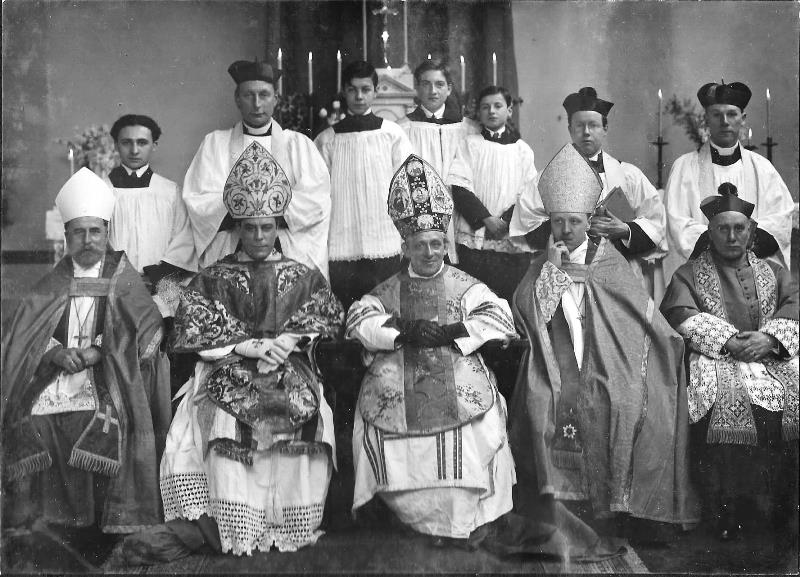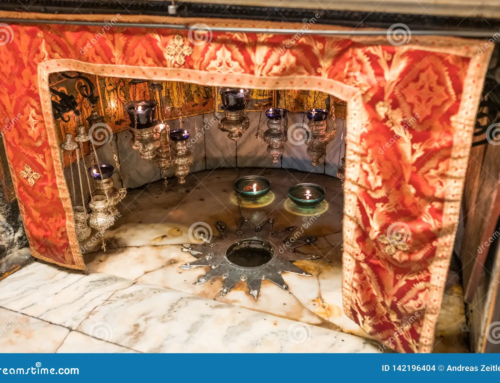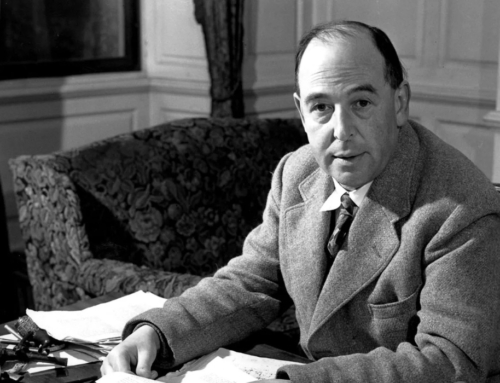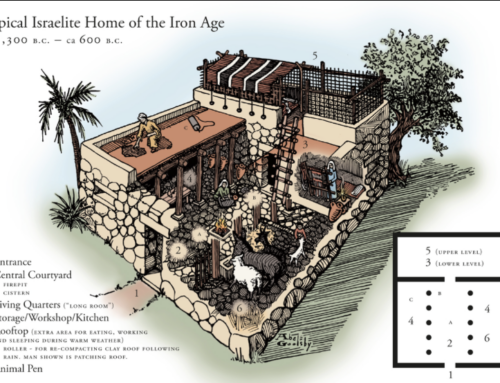With very mixed emotions I’m finally writing my conversion story-autobiography, and on the chapter on Bob Jones University had the chance to reminisce about Bishop James Parker Dees–the founder of the Anglican Orthodox Church–one of many Episcopalian splinter groups.
It led me on a hunt through my library to find a book I had read years ago on the subject of episcopi vagantes aka “wandering bishops.” The definitive history of this most entertaining phenomenon is Peter F. Anson’s Bishops at Large. Published in 1963, it could do with a scholarly update. However, I fear that in the intervening fifty seven years there have been so many Anglican splinter groups and wandering bishops that it would require many years of research and several volumes.
The phenomenon of renegade Anglican bishops really kicked in during the Oxford Movement. Many Anglicans were suddenly enamored with the ancient church and wanted to achieve communion with bishops who had proper valid apostolic succession. However, the establishment of the Church of England was, by and large, broach church, Protestant and staunchly anti-Catholic. Reunion with Rome was one option, but not one which was attractive to many Anglicans who considered their own church to be “the Catholic Church in England.” But if they were persuaded by the writings of the early church fathers and thought apostolic succession was necessary they had to find valid orders from a validly ordained bishop.
They discovered valid apostolic succession within the Old Catholic succession of Utrecht in Holland, and the various Eastern churches…so off they went, some of them sincere and naive in their wish to unify Christendom once more in a church they would start, others simply religious adventurers of the most ambitious and outrageous sort. Some of the men came from humble peasant stock, most were from the ecclesiastical grandma’s attic of the English aristocracy. The ones from the upper class often had independent means by which they financed their churchy fantasy life.
They traveled around Europe–indeed around the world, claiming for themselves the most grandiose titles and performing their rites with ever more ornate ceremonial, ritual and elaborate mummery.
In Henry St John’s introduction he writes,
“In all this there is a queer mixture of the irrepressible, the ridiculous and the pathetic; naive goodness and sincere idealism, unconscious vanity and, at times, conscious roguery: its promoters frequently unstable to a degree, eccentric in some cases to the point of craziness, moving in a dream world of unreality. A marked characteristic of this dream world is a folie de grandeur of high sounding titles and more than extravagant pretensions; these generally in inverse ratio to the number of their adherents and the size of the conventicles in which they worship and still worship with elaborate ritual and ceremonial.”
What tickles me in reading about these preposterous poseurs is how seriously they took themselves. No doubt some were well aware that they were charlatans, shysters and sideshow snake oil salesmen, but most it seems really did believe they were doing God’s work and were starting the church that would somehow or other change the world.
Furthermore, as I have written, their numbers have multiplied, because of course, the Protestant problem persisted and that problem is simply put: When two sincere Christians sincerely disagree they are faced with a stark choice: either they agree that their disagreement was not really that important or one of them stomps off to start his own church. This is precisely what happened to the wandering bishops–most of whom started their enterprise with some sort of idea that their church would be the one in which all good Christians would unite. The irony was that they were schismatic and they fostered ever more schismatics until now the number of splinter Anglican groups (not to mention all the other Protestant sect, conventicles, religious orders, denominations and cults) seem to be like the stars in the heavens or the sand on the shore.
Anson’s book is entertaining simply for the astonishingly preposterous adventures of these religious buccaneers. Among the favorites are Joseph Rene Vilatte, Mar Timotheos, Old Catholic Archbishop of North America and First Primate of the American Catholic Church. From his holy hands other bishops were consecrated and from them even more as they obeyed the Lord’s first commandment: be fruitful and multiply. Vilatte was the son of a French butcher who was ordained as a Catholic priest, ended up in Wisconsin as an Anglican, fell out with his bishop and went to Ceylon to be consecrated by Mar Julius I Metropolitan of the Independent Catholic Church of Ceylon, Goa and India. As the Archbishop Vilatte traveled the world trying unsuccessfully to drum up business.
Another competitor for the most crazy was the Englishman Arnold Harris Mathew who ended up with the titles, Count Poveleri de Vicenza, de jure Earl of Llandaff, Regionary Old Catholic Bishop for England, Archbishop of London and Metropolitan of the English Catholic Church, Western Orthodox Catholic Church in Great Britain and Ireland, Anglo-Catholic Church (Latin and Orthodox United) and Western Catholic Uniate Church.etc.etc.
One of the curiosities this subject makes you think about is how the churches that were considered bona fide solid establishment churches have now becomes just as crazy as the men in Anson’s book. When these bogus bishops were snooping around for apostolic succession they wanted to be accepted by the Church of England and the Old Catholics because they were both considered authentic. Now the Old Catholics (what’s left of them) and the Anglican mainstream are simply one among many mainstream Protestant churches that ordain women bishops, endorse gay sex, abortion and a whole range of weirdness.
I began to wonder further about the bishops who were wandering about it occurred to me that there is really quite a lot of insanity within ecclesiastical circles. Religion can make you weird and freelance religion really makes you weird. What amuses and troubles me is that in my worst moments I fear that I may lapse into the same narcissistic vanity of these men. What is there to keep one sane? What keeps a religious person from veering off into some bizarre byway or backwater? What prevents all of us from going after some apparition or gulping down gullibly the teachings of some charming preacher, a religious huckster or a lunatic conspiracy theorist or apocalyptic prophet?
I think there are a couple of things that can keep the religious person sane. First is to read the Bible every day. There is something solid and concrete and grounded in just reading a chapter of the Bible every day. Second, one should never assume that one has all the answers. It’s okay to be uncertain–especially uncertain of one’s opinions. Thirdly, it is vital to stay with the church and to stay with the Pope. One may not always agree with the pope and we may realize that the pope is ambiguous or mediocre or even immoral and corrupt, but we stay with the official teachings of the pope as they are congruent and consistent with Scripture and the magisterium. Ironically, it is especially when we don’t happen to agree with the pope that it is important to affirm his authority because that keeps us from thinking that we have all the answers and keeps us from going into a cloud cuckoo land of our own imagining.
Finally, one of the things to keep one grounded is to work with the poor. It gets one’s heads out of the clouds to sit and talk to a drug addict, a person who’s life is shattered by ill health or a person who is on the edge of suicide because their whole life is a wreck.
With this in mind, it was interesting that none of the episcopi vagantes were known for their work with the poor. They were too busy claiming the latest grandiose title or being fitted for yet another ecclesiastical vestment or attempting to hob nob with the rich and famous.
Their stories are at once hilarious, bizarre and a cautionary tale for those who are tempted to start their own little sect, gather their adoring devotees and set themselves up as some kind of bogus bishop or pathetic pontiff.







This is pathetically hilarious. I’ve never heard of Martin Luther, or any of the others who rebelled against the Church, performing charitable acts.
Anglicans do seem to have a funny relationship with apostolic succession. Some claim it’s important while others claim isn’t. Some claim it’s not important but that they still have it. Haha!
During my conversion, as I was realizing the importance of apostolic succession, I discussed the last option with a random blogger who claimed to be Anglican. He tried to convince me apostolic succession wasn’t all that important, while simultaneously claiming that Anglicans still had it. I left the conversation thinking, “If it’s not important, why should I believe you still have it? We lose things we don’t care about. We treasure things we do care about. If apostolic succession is important, then I need to join the Church that treasures it.”